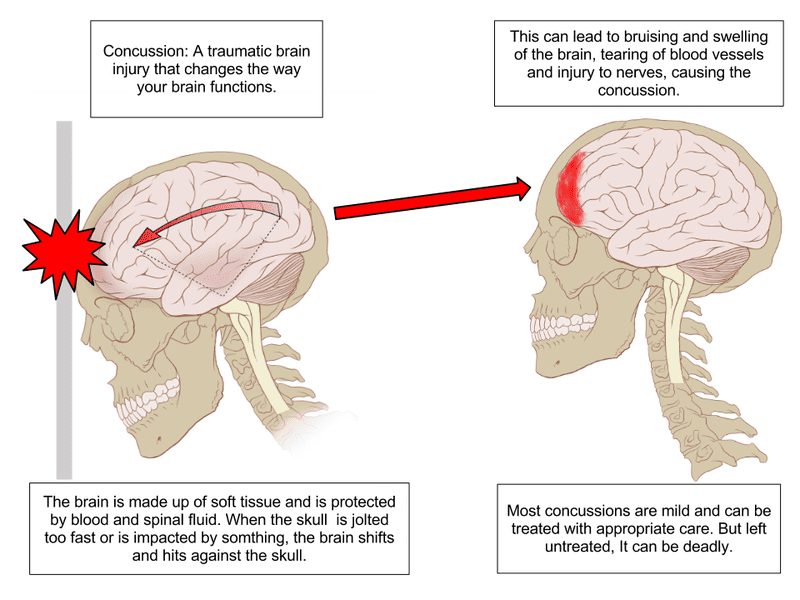By Dansker & AspromonteJanuary 24, 2016
What is a concussion?
A concussion, the most common type of Traumatic Brain Injury (TBI) results from severe impact when the head makes contact with an object. The blunt force created by an abrupt change in momentum or movement of the head, can stretch brain blood vessels damaging the cranial nerves.
For a free legal consultation, call (212) 732-2929
Student athletes are prone to concussions by the sheer nature of the sports they participate in. For example, football is a rough, high contact sport calling for tackles and its players to slam their bodies into players on the other team (A.K.A. hits). Because of the sport’s roughness, all players are required to wear special protective gear at all times during the game. Not only can tackles and “hits” cause jarring of the brain resulting in a concussion, but injuries occur from falling can too. Even with the additional precautions of padded equipment, it only helps to prevent injury.
Safety Tips – Beating Sports Concussion Odds
- Follow coach safety tips and sport safety rules
- Practice good sportsmanship
- Proper sports equipment, including personal protective equipment use
- Using correct equipment for that game and position
- Wear proper equipment with the correct size/fit correctly during every sporting event
Concussion Facts
- Concussion is the most common of TBI injuries.
- Very difficult to diagnose and symptoms of a concussion may not occur immediately.
- Loss of consciousness is not common but can occur lasting up to 20 minutes, but no more; longer can mean a more serious TBI.
- Student athlete may remain conscious but in a “dazed” or “punch drunk” state
- A skull fracture is not a qualifying factor in a diagnosed concussion, there may or may not be one (or more) present.
- Diagnostic image testing such as a CAT Scan, may or may not show a concussion is present.
- Swelling of the brain, or brain bleeding may or may not be present,
- Blood clot(s) can form on the brain and can be fatal.
- Diffuse axonal type injury damage, such as amnesia can be temporary or permanent.
- Healing from a concussion can take a few months, or even up to a few years.
Signs and Symptoms Your Athlete Could Have a Concussion
Concussions, considered a mile TBI, can come with consequences resulting in memory problems, impaired thinking and behavioral or emotional changes. It is very important coaches, parents and student athletes recognize symptoms.
Physical Signs
- Headache
- Pressure in the Head
- Nausea
- Vomiting
- Dizziness
- Balancing Problems
- Fatigue
- Visual Problems – Blurry or Double Vision
- Light Sensitivity
- Noise Sensitivity
- Dazed, Stunned or “Punch Drunk”
- Tingling or Numbness
Cognitive Signs
- Slowed Down Feeling
- Mentally Foggy Feeling
- Concentration Difficulty
- Memory Difficulty
- Short-term Memory Loss
- Confusion of Recent Events
- Answers Questions Slowly
- Repeats Questions Asked
Emotional Signs
- Sadness
- Overly Emotional
- Irritability
- Nervousness
Sleep Signs
- Trouble Falling Asleep
- Drowsiness
- Sleeps More than Normal
- Sleeps Less than Normal
Your student athlete has a concussion, what now? What is the suggested care for complete recover?
Tips on Healing from a Concussion
- Get plenty of rest and sleep.
- Eat healthy, and the recommended foods.
- Avoid physically demanding activities.
- Avoid contact or recreational sport activities.
- Once cleared by your doctor, return to normal activities gradually.
- Take only the drugs approved by your doctor.
- In early recovery time, avoid consistent computer use and video games.
Activity Tips – Safety First
- Ability to react can be slower post-concussion – ask your doctor if it is safe to ride a bike or drive a car.
- Ask your doctor when you can return to school or work.
- Make a list of the thing harder to remember.
- If easily distracted, try doing a single task at a time.
Competitive sports, well, is just that, competitive; and adrenaline is heightened. At times, some players can become “overzealous” resulting in unsportsmanlike behavior and negligence. When this occurs, undue and avoidable injuries can happen. You may find seeking the advice from one of NYC Concussion Injury Lawyers is the best course of action.
Our experienced team has assisted personal injury victims with claims involving car accidents, construction accidents, wrongful death, and other serious injuries.
Call or text (212) 732-2929 or complete a Free Case Evaluation form

